Guatemala blocks leftist Indigenous leader from presidential race, in 'electoral coup'
Guatemala’s right-wing government banned Indigenous leader Thelma Cabrera and her leftist Movement for the Liberation of the Peoples (MLP) party from running in the presidential election.
By Jimmy Zúñiga Wallace and Ben Norton
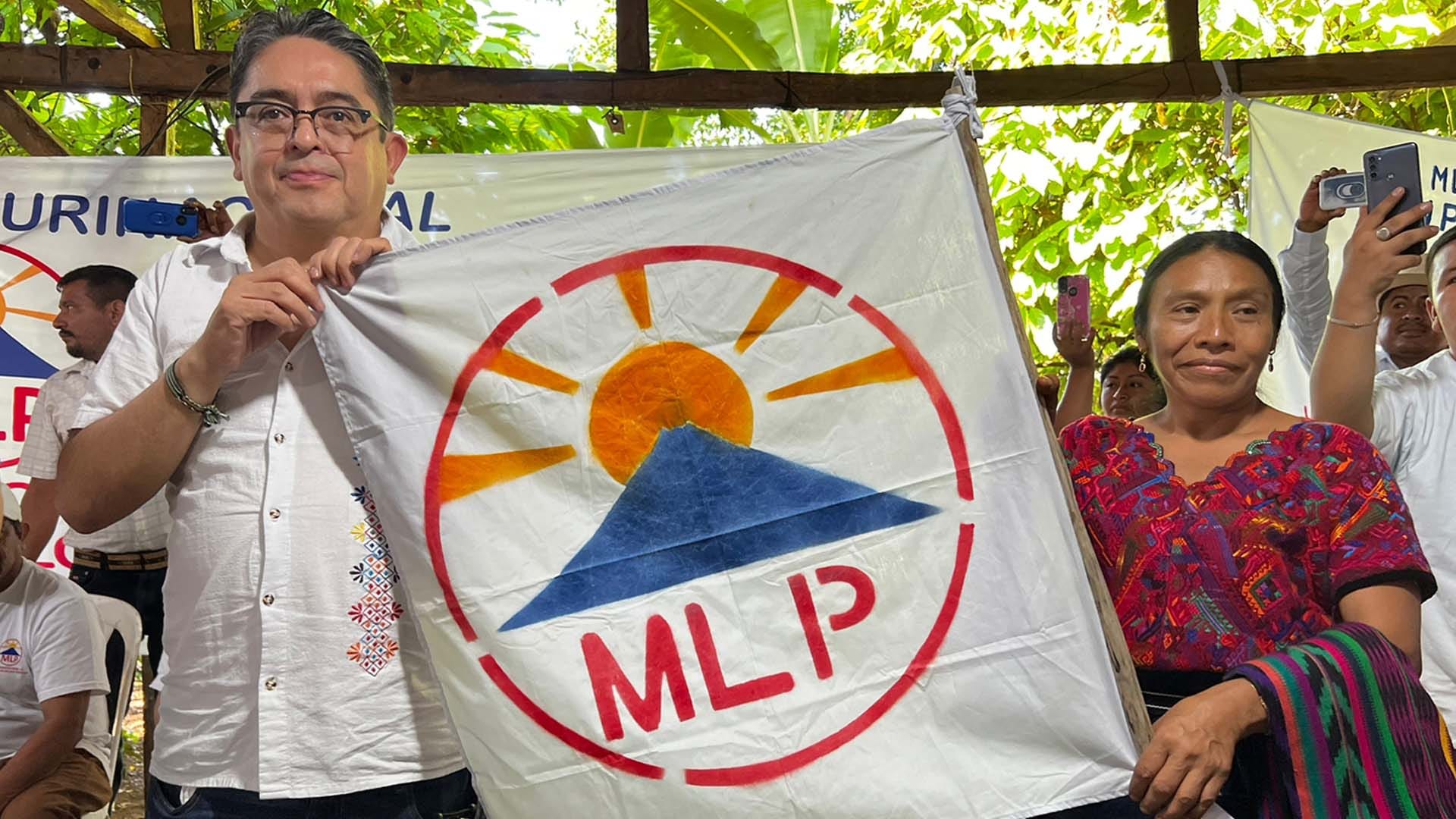
Guatemala's notoriously corrupt right-wing government has blocked a prominent leftist Indigenous leader from running in the June 2023 presidential election, in a move that international observers have condemned as an "electoral coup".
Nearly half of Guatemalans (44%) identify as Indigenous. The Movement for the Liberation of the Peoples (MLP) is a left-wing party that was created to represent the First Nations who have for so long been ignored by Guatemala's political system.
The MLP is led by Thelma Cabrera, a social movement activist and human rights defender from the Maya Mam community. She has pledged to fight poverty in Guatemala (one of the poorest countries in the region), resist neoliberalism, and establish a plurinational state that gives full rights to Indigenous nations, like Bolivia.
The newly created MLP party ran for the first time in the 2019 presidential election. Cabrera came in fourth place, winning more than 10% of the vote in the first round, compared to just 14% for current right-wing President Alejandro Giammattei.
Since then, the MLP has only become more popular, gaining support across Guatemala. Giammattei, a staunch conservative and wealthy dual citizen of Italy, has seen the growth of the MLP as a threat.
The MLP's vice-presidential candidate is Jordán Rodas Andrade. He was appointed Guatemala's human rights ombudsman in 2017. Before his term ended in 2022, Rodas had become well known for his criticism of President Giammattei and the blatant corruption in his government.
Upon leaving the position, Rodas condemned Guatemala's wealthy corporate oligarchs. "They think they are the plantation owners. They have done so much damage to this country", he said.
In late January 2023, Guatemala's Supreme Electoral Tribunal (TSE) blocked Cabrera and Rodas from participating in the upcoming election, which will be held on June 25.
Guatemalan social movement activists and international observers have reported that the TSE is deeply politicized and acts in the interests of Giammattei and the country's powerful oligarchs.
Cabrera and her MLP party filed an appeal, but on February 2, the TSE ruled against them, officially banning them from the race.
The Guatemalan electoral authority claimed they cannot run because their application was "invalid".
Cabrera shared the completed paperwork on Twitter, insisting that "we fulfilled all the legal requirements". Rodas also explained that he submitted all the required paperwork, and a review of his record found no legal cases or complaints against him.
"Any additional requirement is not found in the law; it cannot be invoked to avoid my candidacy and violate my right to be elected", he said.

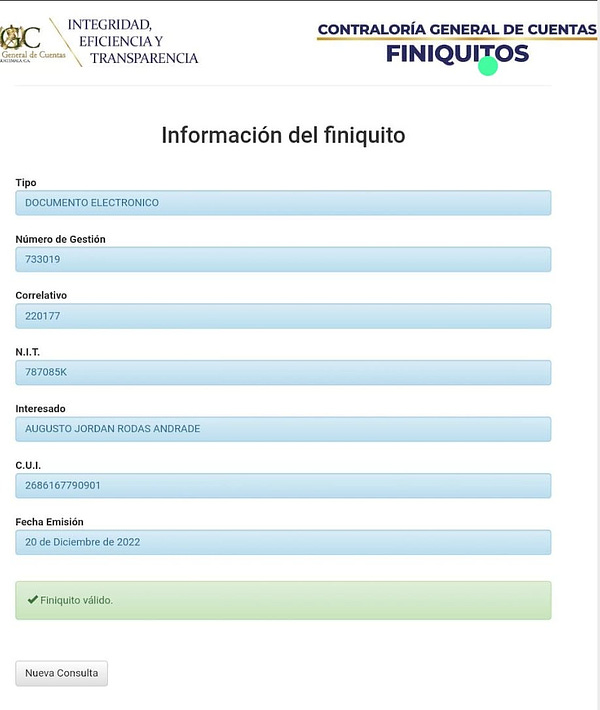
Guatemala's 'electoral coup' bans leftists while allowing convicted drug money launderers and family members of war criminals to run for office
Hundreds of activists protested at the TSE, condemning the electoral court's decision. An MLP supporter said, "If you all don't register our candidates, there won't be elections”. Their movement has vowed to go on strike and hold large demonstrations until the decision is reversed.
Even Western government-funded organizations that are deeply biased against the Latin American left have warned that the Giammattei government is increasingly authoritarian.
The International Institute for Democracy and Electoral Assistance (IDEA), which is funded by the US government and multiple European states, has long shown prejudice in support of the Latin American right. But IDEA's regional director, Daniel Zovatto, admitted that TSE's ban of Cabrera and Rodas is a kind of "electoral coup”.
"The decision declaring inadmissible the appeal for annulment by the MLP, leaving the Cabrera-Rodas ticket out of the electoral contest, is an 'electoral coup' that corrupts the integrity and credibility of the elections", Zovatto said.
Vicenta Jerónimo, the lone MLP representative in Guatemala's congress, referred to the struggle as "a battle of the oligarchy against the peoples".
"That is because we also know that all state institutions are co-opted in the hands of corrupt thieves in this country", she said.
In one of the many demonstrations that have taken place throughout the country, Jerónimo stated, "We also see in the Supreme Electoral Tribunal that they have registered children of the genocide that murdered my parents, my grandparents, my uncles in the armed conflict".

Jerónimo was alluding to Zury Ríos, a right-wing presidential candidate who is the daughter of Guatemala's former dictator Efraín Ríos Montt.
The United States supported the Ríos Montt regime in the 1980s, as he massacred Indigenous communities. In 2013, he was sentenced for crimes against humanity and genocide.
An independent truth commission found that, during Guatemala's civil war, the US-backed military carried out 93% of civilian killings, whereas socialist guerrillas were responsible for just 3%.
It is estimated that as a result of the genocide perpetrated by Ríos Montt, at least 200,000 children became orphans and around 5,000 more disappeared.
The vast majority of attacks perpetrated by the Guatemalan military against the population were against civilians who had no connection to the conflict.
Ironically, Zury Ríos launched her presidential campaign for the 2023 elections despite having a constitutional ban that kept her out of the race in 2019, due to her close ties with her father.
But the TSE is now allowing Zury Ríos to run. The same electoral body that once banned the proud, unapologetic daughter of a convicted war criminal is today blocking the candidacy of an Indigenous leader and prominent human rights defender.

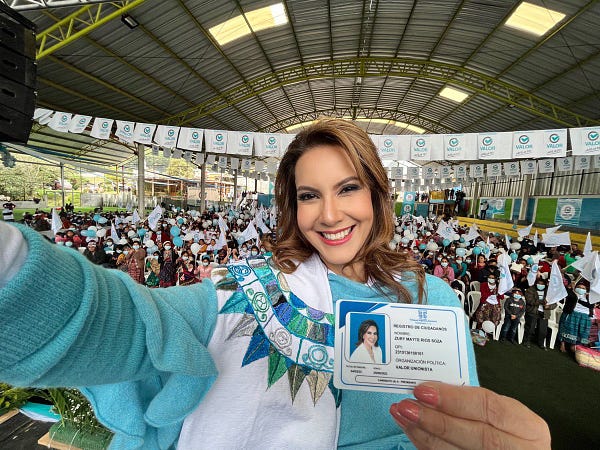
Likewise, the TSE has allowed wealthy right-wing businessman Manuel Baldizón to run in the 2023 elections, despite the fact that he was imprisoned in the United States for laundering drug money, and deported to Guatemala in 2022.
Baldizón is running for congress, as part of the right-wing Cambio party. His son Jorge Eduardo Baldizón Vargas is also a congressional candidate, and their fellow family member Álvaro Manuel Trujillo Baldizón is running for president.
Why is the Guatemalan oligarchy afraid of Thelma Cabrera and Jordán Rodas?
When Thelma Cabrera won more than 10% of the vote in the first round of the 2019 election, coming just a few points shy of making the run-off, she frightened Guatemala's oligarchy.
Among the ideas she was advocating for included recovering territories exploited by agribusiness and extractive corporations, creating an anti-monopoly law, asserting collective rights of the lands of Indigenous peoples, and reducing poverty in one of the poorest countries in the region.
These proposals are very popular among working-class Guatemalans. This explains the large protests the country has seen in response to the TSE ban.


Cabrera is also a supporter of Latin American integration, and has praised other left-wing governments in the region.
Under Giammattei, Guatemala recognized US-appointed coup leader Juan Guaidó as supposed "interim president" of Venezuela. In 2019, he unsuccessfully tried to enter Venezuela using his Italian passport, hoping to meet with Guaidó.
Guatemala's right-wing regime is one of the very few governments in Latin America that has supported Ukraine in the NATO proxy war against Russia. Cabrera criticized Giammattei for visiting Kiev and posing for photos with its Western-backed leader Volodymyr Zelensky.
The next step for Cabrera and her running mate Jordán Rodas will be to appeal the TSE's decision at Guatemala's Supreme Court of Justice.
In the mean time, their Movement for the Liberation of the Peoples is organizing protests, demanding systemic change in the country.






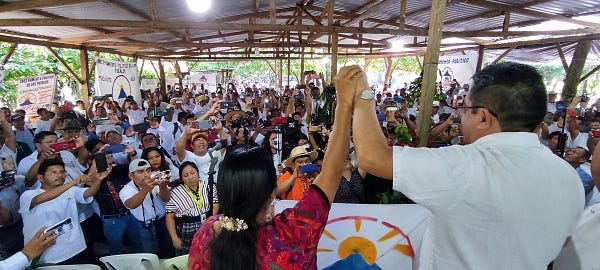
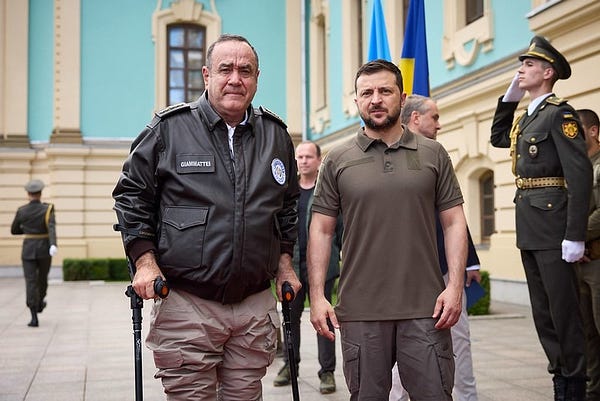
Thank you for this important news item.